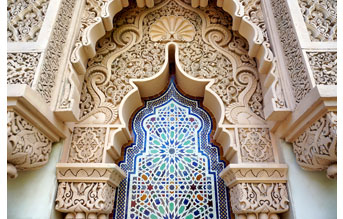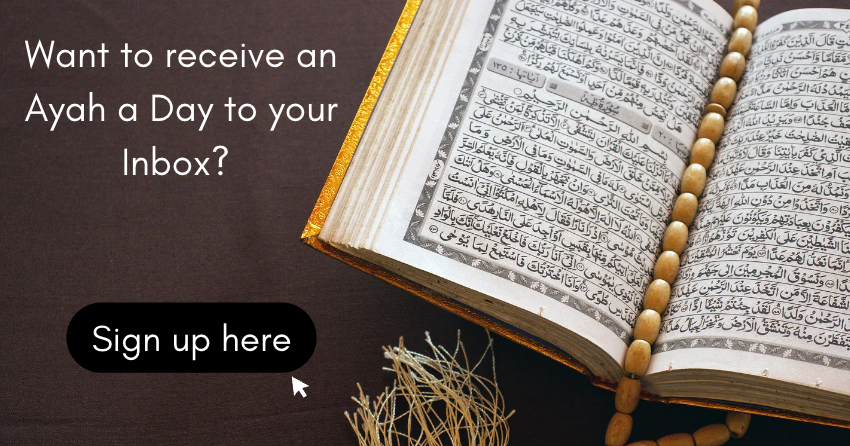Uzair (Era) Part I

Uzair was one of the pious men within Bani Israel, who lived after the time of Musa AS. He was a firm believer who committed the Taurat (Torah) to memory, and was famed for being so pious that all his supplications to Allah came true. There is speculation that he might have been a prophet, but this is something that was never confirmed by the Qur’an or the Sunnah.
One day, Uzair was travelling, and passed by a ruined and abandoned village where all the inhabitants had been killed. He wondered: “Oh! How will Allah ever bring it to life after its death?” Uzair had no doubt about Allah’s omnipotence, but puzzled at the mechanics of how resurrection would be effected in practice.
He dismounted from his donkey and took refuge in a cave, bringing with him some dried bread and some fresh grapes which he then pressed into a juice. He soaked the bread into the juice to soften it, as was the customary way of eating the bread during those days, and then fell asleep.
In actual fact, Allah had caused him to die for one hundred years. This is not to be confused with the long sleep that the Companions of the Cave underwent for 300 years, nor is it the normal death that we will all experience. In Uzair’s case, the angel of death came and plucked his soul temporarily. Uzair was physically dead for a century – the full details are something that is in the realms of unseen knowledge.
Over time, Uzair’s donkey decomposed, its flesh and skin decayed and disintegrated, and only its skeleton remained.
After a century had passed, Uzair was brought back to life. He heard a voice: “How long did you remain dead?” Uzair replied “ (Perhaps) I remained (dead) a day or part of a day.” This meant that Uzair, in his death state, had no awareness of his surroundings, not even the passing of time.
The voice said: “Nay, you have remained (dead) for a hundred years.” Uzair was then asked to look around him. He observed that his bread was still intact and his juice was still fresh, which on the face of it confirmed that only a day or half a day had passed.
However, he was asked to look at his donkey. His donkey was gone. Having been dead for a hundred years, only bones and dust were left.
He was asked to continue looking at the donkey. Before Uzair’s astounded eyes, Allah reversed the decomposition process. The donkey’s bones were reassembled, and were clothed with flesh, muscles and skin. Life was breathed into the donkey, and it was restored to its original position and resurrected.
Witnessing how Allah revived the dead was more than enough proof for Uzair and he declared: “I know (now) that Allah is Able to do all things”
(All the above italicized portions are translated from surah Al Baqarah, verse 259.)
We would like to remind our readers that many of the Qur’anic stories also have similar versions in the Jewish tradition. The rule of interpretation is that if the Jewish traditions conflict with Muslim traditions, then they are to be disregarded and rejected. If the Jewish traditions mention something which is not contained in Muslim scriptures, whether in the Qur’an and Hadith, and furthermore do not contradict any Islamic teachings, then we are to neither believe nor disbelieve the Jewish version, although we are permitted to derive the moral of the story from such traditions.
Based on Jewish traditions, the early Muslim scholars agree that Uzair then rode his donkey back to his hometown, but with the passing of time, the people were unfamiliar. The streets had changed and he located his old house with great difficulty. When he arrived he was greed by a crippled blind old woman who was over a hundred years old. She was actually his maid in the past and was a young lady when he last saw her.
He asked her whether this was the house of Uzair, to which she wept and replied that no one even remembered Uzair anymore. He told her that he was indeed Uzair, and that Allah had caused him to die for a hundred years before bringing him back to life again.
The maid said: “Glory is to be to Allah! We lost Uzair one hundred years ago and never heard anything about him.” However, she was not prepared to accept his words as the truth. She said that from her recollection, Uzair was a man whose supplications were accepted by Allah. She asked him to invoke to Allah to return her sight to her, and if he were truly Uzair, his supplication would be accepted and so that she could confirm that he was who he claimed to be.
Written by Muslim Footsteps
http://www.muslimfootsteps.com/?q=Uzair_AS
Since You’re Here… we have a small favour to ask.
In these extraordinary times, millions rely on HOTD for daily uplifting & inspiring content. Established since 2009 and with your kind support we’ve seen readers elevate their Imaan & strive for better on a daily basis. We’re committed to keeping our content freely available and open for all readers. Every contribution, however big or small, makes a difference and help us spread knowledge to millions daily
HOTD is something special, it’s a place where people can come to be inspired, to renew their faith, to learn and share knowledge, to fall in love with our faith and also our Prophet (peace and blessings be upon him and his family).
All content on HOTD is free. We believe what we do in this life builds for the next one and we work tirelessly with the aim to please Allah and inspire the global Muslim community as
well as providing information and inspiration for anyone interested in Islam. We simply cannot do this without your support and your support helps us continue our services.
If there were ever a time to join us, it is now. You can support HOTD and help sustain our future. Support Hadith of the Day and make a one-off donation or give regularly from as little as £10 a month Jazak’Allah Khayr – whatever you donate will come back to benefit you Insha’Allah as whatever is spent in the way of Allah is an investment in the future and the next life. Thank you.

















































































